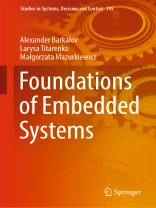This book is devoted to embedded systems (ESs), which can now be found in practically all fields of human activity. Embedded systems are essentially a special class of computing systems designed for monitoring and controlling objects of the physical world.
The book begins by discussing the distinctive features of ESs, above all their cybernetic-physical character, and how they can be designed to deliver the required performance with a minimum amount of hardware. In turn, it presents a range of design methodologies. Considerable attention is paid to the hardware implementation of computational algorithms. It is shown that different parts of complex ESs could be implemented using models of finite state machines (FSMs). Also, field-programmable gate arrays (FPGAs) are very often used to implement different hardware accelerators in ESs. The book pays considerable attention to design methods for FPGA-based FSMs, before the closing section turns to programmable logic controllers widely used in industry.
This book will be interesting and useful for students and postgraduates in the area of Computer Science, as well as for designers of embedded systems. In addition, it offers a good point of departure for creating embedded systems for various spheres of human activity.
Table des matières
Introduction into embedded systems.- Design of embedded systems.- Implementation of computational algorithms in embedded systems.- Field programmable gate arrays.- Implementing Control Algorithms with FPGAs.- Programmable Logic Controllers.- Conclusion.












